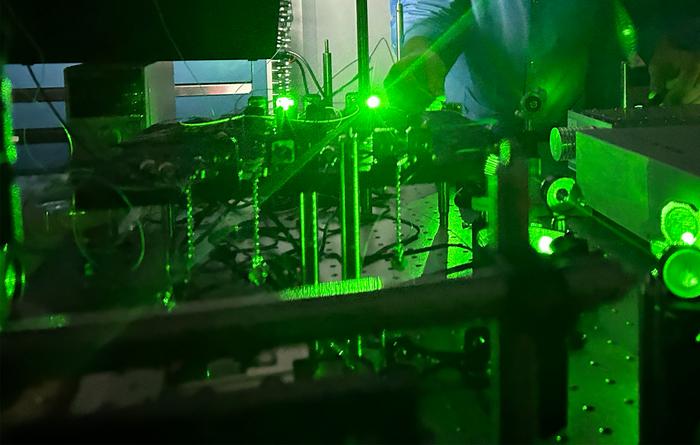Using laser light, researchers have developed the most robust method currently known to control individual qubits made of the chemical element barium. The ability to reliably control a qubit is an important achievement for realizing future functional quantum computers.

Credit: University of Waterloo
Using laser light, researchers have developed the most robust method currently known to control individual qubits made of the chemical element barium. The ability to reliably control a qubit is an important achievement for realizing future functional quantum computers.
This new method, developed at the University of Waterloo’s Institute for Quantum Computing (IQC), uses a small glass waveguide to separate laser beams and focus them four microns apart, about four-hundredths of the width of a single human hair. The precision and extent to which each focused laser beam on its target qubit can be controlled in parallel is unmatched by previous research.
“Our design limits the amount of crosstalk–the amount of light falling on neighbouring ions–to the very small relative intensity of 0.01 per cent, which is among the best in the quantum community,” said Dr. K. Rajibul Islam, a professor at IQC and Waterloo’s Department of Physics and Astronomy. “Unlike previous methods to create agile controls over individual ions, the fibre-based modulators do not affect each other.
“This means we can talk to any ion without affecting its neighbours while also retaining the capability to control each individual ion to the maximum possible extent. This is the most flexible ion qubit control system with this high precision that we know of anywhere, in both academia and industry.”
The researchers targeted barium ions, which are becoming increasingly popular in the field of trapped ion quantum computation. Barium ions have convenient energy states that can be used as the zero and one levels of a qubit and be manipulated with visible green light, unlike the higher energy ultraviolet light needed for other atom types for the same manipulation. This allows the researchers to use commercially available optical technologies that are not available for ultraviolet wavelengths.
The researchers created a waveguide chip that divides a single laser beam into 16 different channels of light. Each channel is then directed into individual optical fibre-based modulators which independently provide agile control over each laser beam’s intensity, frequency, and phase. The laser beams are then focused down to their small spacing using a series of optical lenses similar to a telescope. The researchers confirmed each laser beam’s focus and control by measuring them with precise camera sensors.
“This work is part of our effort at the University of Waterloo to build barium ion quantum processors using atomic systems,” said Dr. Crystal Senko, Islam’s co-principal investigator and a faculty member at IQC and Waterloo’s Department of Physics and Astronomy. “We use ions because they are identical, nature-made qubits, so we don’t need to fabricate them. Our task is to find ways to control them.”
The new waveguide method demonstrates a simple and precise method of control, showing promise for manipulating ions to encode and process quantum data and for implementation in quantum simulation and computing.
The paper, A guided light system for agile individual addressing of Ba+ qubits with 10−4 level intensity crosstalk, was published by Ali Binai-Motlagh, Dr. Matt Day, Nikolay Videnov, Noah Greenberg, Senko and Islam in Quantum Science and Technology.
Journal
Quantum Science and Technology




